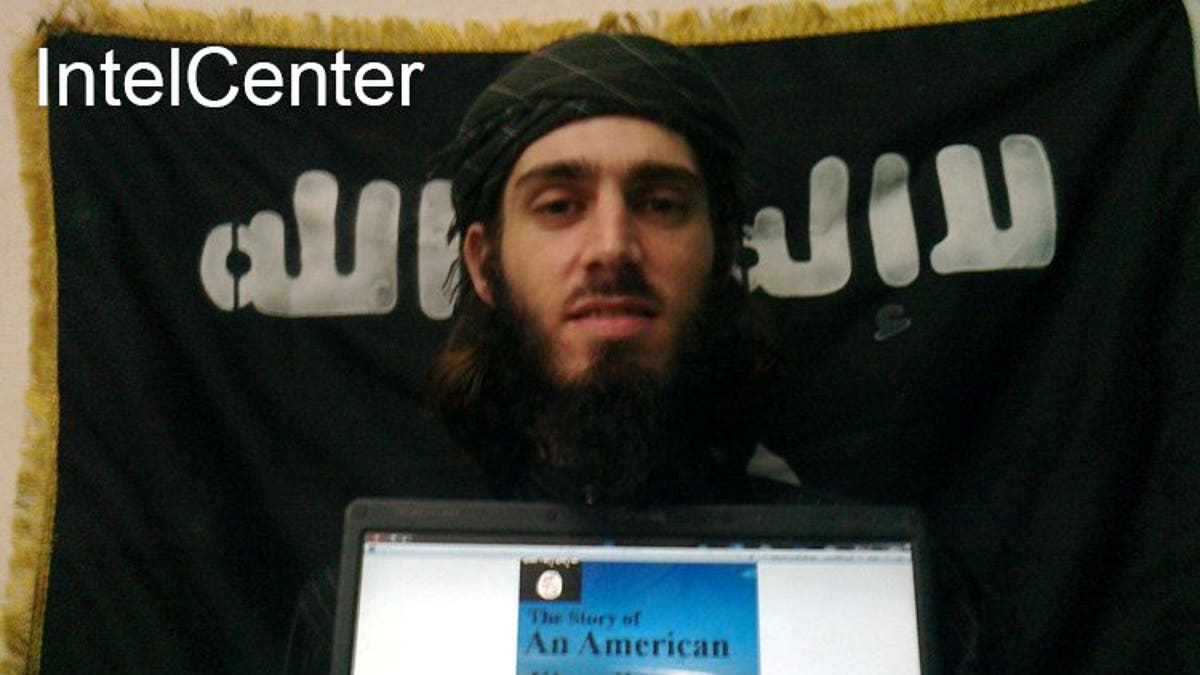
A handout photo from the IntelCenter shows American extremist Omar Hammami on May 23, 2012. Hammami, who was reported killed in Somalia, switched a mundane life in Alabama for a spot in the global Jihad, earning a $5 million bounty on his head from the US but eventually falling foul of his fellow fighters. (IntelCenter/AFP/File)
MOGADISHU (AFP) – American extremist Omar Hammami, who was reported killed in Somalia on Thursday, switched a mundane life in Alabama for a spot in the global Jihad, earning a $5 million bounty on his head from the US but eventually falling foul of his fellow fighters.
The Rambo-inspired Hammami -- better known as Al-Amriki or "the American" -- was reported killed in a shootout with the Al-Qaeda-linked Shebab insurgents he had left America to fight alongside.
Born in 1984 to a southern Baptist mother with Irish roots and a Muslim father with a Syrian background, Hammami said he had an unremarkable upbringing in Daphne, Alabama, with the usual teenage crushes on girls and occasional deer hunting.
But he jetted into anarchic Somalia in 2006 and began to work for the Shebab rebels, helping woo young foreigners through his English-language rap songs and videos.
Writing in his autobiography, "The Story of An American Jihadi", Hammami details the strange journey that took a boy once top in Bible studies to a faraway war to become a fugitive from his homeland.
"I guess I hope that Muslims around the world also take my life as an example," he wrote in the book, which he released last year on Islamist websites.
"Not that I'm extremely special, but then again I haven't seen too many middle class 'white guys' from Alabama in jihad these days. Hopefully others will say to themselves: I can do that too!"
At one time Hammami was seen as a key leader for foreign fighters in the Shebab, though many downplayed his significance, and he dramatically fell out with senior commanders.
He showed little ability at fighting itself: describing his struggle on arrival in the Somalia to integrate with the fighters, and joy at being given an automatic rifle -- which he "had no idea how to use" at first.
Later he received hand grenades, his experience with which he admitted was limited to that of "anyone who had previously watched a Rambo flick (film)".
But he also detailed hardships including poor food, as well as a constant fear of attacks by unmanned drones.
"The common discussions were whether or not it was lawful to eat frogs... we would find comfort in remembering the different restaurants, fast food joints and home cooking" left behind, he added.
The closing remarks of his autobiography are "viva la revolucion", adding he prayed only "that Allah grants me a righteous ending".
But he also spoke poignantly of the family he left behind, including the baby daughter he abandoned in Egypt. He also spoke of homesickness and craving Chinese takeaway.
"I knew that I was going to become a fugitive for the rest of my life when I made that decision (to fight in Somalia), I was well into the post 9/11 era," he wrote.
"Someone seeking a thrill or a hippy's midsummer's night dream doesn't normally consciously burn his bridges like that."
